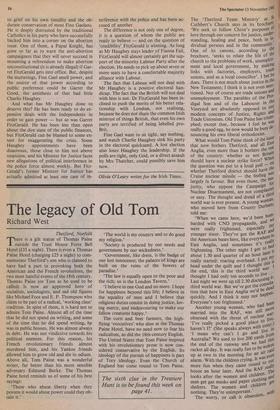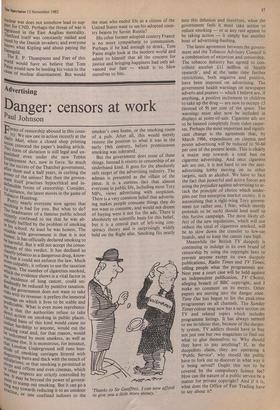The legacy of Old Tom
Richard West
Thetford, Norfolk
There is a gilt statue of Thomas Paine outside the Trust House Forte Bell Hotel (£35 a night). There is even a Thomas Paine Hotel (charging £25 a night) to com- memorate Thetford's son who is claimed to have had a part in provoking both the American and the French revolutions, the two most hateful events of the 18th century. Thomas Paine (or Tom as he used to be called) is now an approved hero of socialists, sociologists, and sad old figures like Michael Foot and E. P. Thompson who claim to be part of a radical, 'working class' tradition. In spite of them, it is hard not to admire Tom Paine. Almost all of the time that he did not spend on writing, and some of the time that he did spend writing, he was in public houses. He was almost always in debt. He was not vindictive towards his political enemies. For this reason, his French revolutionary friends almost murdered him, and his Yankee friends allowed him to grow old and die in odium. Above all, Tom Paine was a wonderful writer, far better than his more sensible adversary Edmund Burke. The Thomas Paine hotel reminds us of some of his best sayings:
'Those who abuse liberty when they possess it would abuse power could they ob- tain it.' 'The world is my country and to do good my religion.'
'Society is produced by our needs and government by our wickedness.'
'Government, like dress, is the badge of our lost innocence; the palaces of kings are built on the ruins of the bowers of paradise.'
'The law is equally open to the poor and the rich; so is the London Tavern.'
'I believe in one God and no more. I hope for happiness beyond this life; I believe in the equality of men and I believe that religious duties consist in doing justice, lov- ing mercy, and endeavouring to make our fellow creatures happy.'
The corn and beet farmers, the high- flying 'executives' who dine at the Thomas Paine Hotel, have no need now to fear his radicalism, as did the 18th-century English. The United States that Tom Paine inspired with his revolutionary prose is now con- sidered conservative by the English. Its ideology of the pursuit of happiness is part of Tory ideology. Even the Church of England has come round to Tom Paine.
The Spectator 13 November 1982 The 'Thetford Team Ministry' at Si Cuthbert's Church says .in its brochure: 'We seek to follow Christ's purposes al love through our concern for justice, under- standing, healing and peace, both in in- dividual persons and in the community. One of its canons, according to the brochure, 'seeks to relate the life of the church to the problems of work, unemPloY- ment and local government, by making links with factories, employers, trade unions, and as a local councillor'. I bet he does. There is not much about justice in the New Testament; I think it is not even Men; tioned. Nor of course are trade unions On unemployment. The parables of the Pro- digal Son and of the Labourer in the Vineyard are absolutely opposed to our modern concepts of Justice, Rights and Trade Unionism. Old Tom Paine has trium- phed; except that,- because I feel he was really a good egg, he now would be busy de- nouncing his own liberal orthodoxies. What would Tom Paine think of the issue that now bothers Thetford, and all east Anglia, even more than it bothers the rest of the country: whether or not Britain,, should have a nuclear strike force? When the question was put to a local poll — whether Thetford district should have the Cruise nuclear missile — the feeling was largely in favour. But even those, the ma- jority, who oppose the Campaign fo„ri Nuclear Disarmament, are not comPlace'% or easy. The thought and dread of a third world war is ever present. A young woman' who moved here from County told Durham'
me: 'When we came here, we'd been bom-
barded with CND propaganda, and we were really frightened, especially and younger sister. They've got the RAF an the American bases here, like everywhere in East Anglia, and sometimes it's really frightening. The other night I got to bed about 1.30 and quarter of an hour later it really started: roaring overhead. I put M.); head under the quilt and I thought this I/ the end, this is the third world war' thought I had only ten seconds to live • :ti Last night we were up till 2.30 discussing,I_, third world war. But we've got the consomd tion that here in East Anglia we'd be dea quickly. And I think it may not haPPen
Everyone's too frightened.' been
Another young woman, who had re married into the RAF, was still lit: obsessed with the threat of nuclear w,",, 'I've really picked a good place to live) haven't I?' (She speaks always with ironyiii) 'I mean why can't I go and live , Australia? We used to live 200 Yards fr°,.'"is the end of the runway and we had t,_110 racket all day. It was really fun to be wot"d up at two in the morning for an air rat ven alarm. With the children crying. It was even more fun when they came round to oaluty house an hour later. And the RAF re ,-he
an
looks after the women and children. I'd men get gas masks and paper clothing _.t shelters. The women and children g`
nothing. They're unimportant.' with The worry, or call it obsession,
nuclear war does not somehow lead to sup- Port for CND. Perhaps the threat of war is Ingrained in the East Anglian mentality. Thetford itself was constantly raided and lazed by the Danish invaders; and everyone ,Kilows what Kipling said about paying the uattegeld. The E. P. Thompsons and Feet of this wo.rld would have us believe that Tom aloe would now be lending his voice to the cause of nuclear disarmament. But would
the man who ended life as a citizen of the United States want to see his adopted coun- try beaten by Soviet Russia? His other former adopted country France is no more sympathetic to communism. Perhaps if he had enough to drink, Tom Paine might look at the modern world and admit to himself that all the concern for justice and bringing happiness had only ad- vanced our fate — which is to blow ourselves to bits.















































 Previous page
Previous page